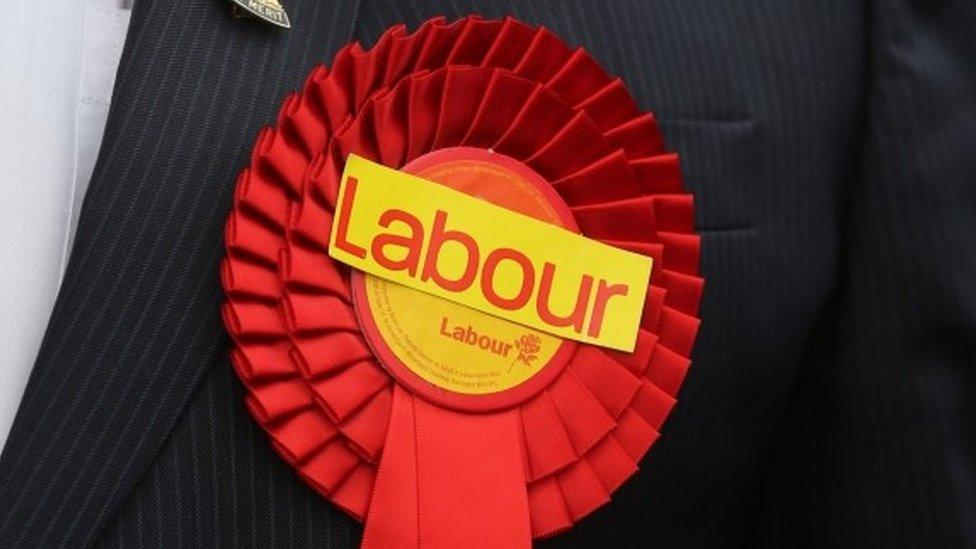Opposition to Jeremy Corbyn 'hindered' anti-Semitism action, claims report
- Published

Anti-Jeremy Corbyn sentiment within Labour hindered the party from tackling anti-Semitism, says a leaked report.
The internal party document said an "abnormal intensity of factional opposition" to the former leader "inhibited the proper functioning" of the party and its complaints procedure.
But it also said Labour was "ill-equipped" and did not act fast enough.
The Campaign Against Anti-Semitism said the report was leaked as an attempt to "smear whistleblowers".
It is understood the document - dated March 2020 - is a draft drawn up to help inform the party's responses to an investigation by the Equality and Human Rights Commission (EHRC).
The watchdog launched a probe into anti-Semitism within Labour in May 2019 after a complaint from the Campaign Against Anti-Semitism.
A Labour spokesman said the party had submitted "extensive information to the EHRC and responded to questions and requests for further information" - but none of that detail was included in the leaked report.
The party's new leader and deputy, Sir Keir Starmer and Angela Rayner, said the leaking of the document and some of its content - such as conversations between staff -"raised a number of matters of serious concern".
They said they would launch an urgent investigation into why the report was commissioned, its contents, and how it ended up in the public domain.
The leaked document said Labour's latest investigation into anti-Semitism in the party revealed "a litany of mistakes, deficiencies, and missed opportunities to reform, develop and adapt a clearly failing disciplinary system", and "disproved any suggestion that anti-Semitism is not a problem in the party".
It also said the "rigorous and far-reaching reforms necessary to bring the party's procedures up to standard were not undertaken early enough".
However, the document claimed the "extremely strained relationship" between Mr Corbyn and Labour headquarters during his tenure had stopped oversight "over the disciplinary process", with the party's management being "generally more obstructive than it was constructive".
It included transcripts of WhatsApp messages between staff, which it said showed opposition to Mr Corbyn, and said, at the extreme, some seemed to have "taken a view that the worse things got for Labour, the happier they would be since this might expedite Jeremy Corbyn's departure from office".
The report claimed to have found "no evidence" of anti-Semitism complaints being handled differently to other forms of complaint, and said that in 2019, half of all anti-Semitism complaints came from a "one individual" who the reports accuses of being "rude and abusive" to party staff.
It also claimed there had been a "steady, if imperfect, rate of improvement" after Mr Corbyn's ally, Jennie Formby, took over as general secretary from the former post holder, Ian McNicol.
'Last-ditch attempt'
The document praised measures taken by Mr Corbyn since 2018, including the introduction of fast track expulsions, describing the moves as "transformational".
It added: "These safeguards ensure that the past mistakes in the handling of anti-Semitism complaints cannot be repeated now."
But the Campaign Against Anti-Semitism, which reported Labour to the EHRC, said the report "serves as an exhibit of the party's failure to address the crisis" and should be handed over to the watchdog.
The organisation's chief executive, Gideon Falter, said: "In the dying days of Jeremy Corbyn's leadership, the Labour Party appears to have invested in a desperate last-ditch attempt to deflect and discredit allegations of anti-Semitism.
"Rather than properly dealing with cases of anti-Semitism and the culture of anti-Jewish racism that prevailed during Mr Corbyn's tenure, the party has instead busied itself trawling through 10,000 of its own officials' e-mails and WhatsApp messages in an attempt to imagine a vast anti-Corbyn conspiracy and to continue its effort to smear whistleblowers."
Momentum - the group originally set up to back Mr Corbyn as Labour leader - has called on his successor, Sir Keir Starmer, to announce a full inquiry into the report.
Ongoing row
Labour has been plagued with allegations since 2016.
Mr Corbyn held an internal investigation early on in his tenure, but it was widely criticised by Jewish members of the party, with a number - including MPs - leaving over his handling of the row.
The party's new leader, Sir Keir Starmer, has apologised to the Jewish community for the ongoing issue.
He has been praised by leaders for "achieving more in four days" than Mr Corbyn did "in four years" on tackling anti-Semitism.